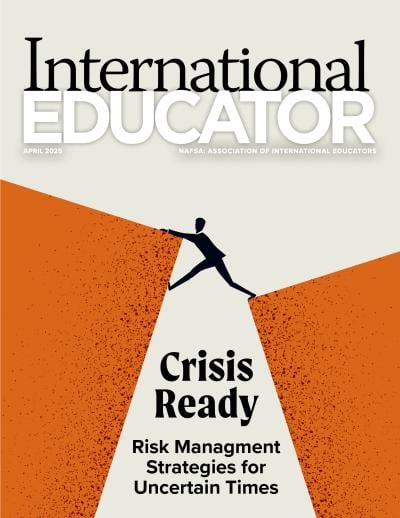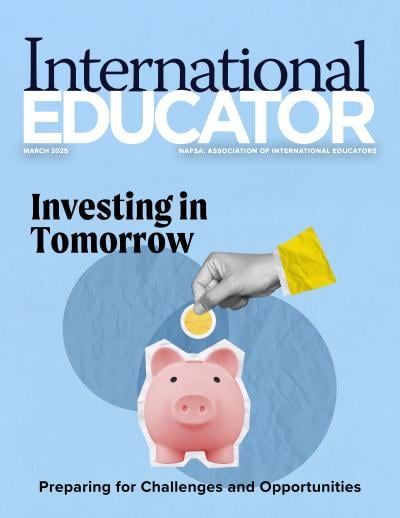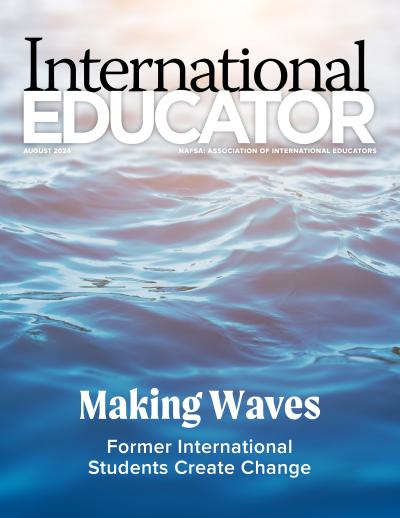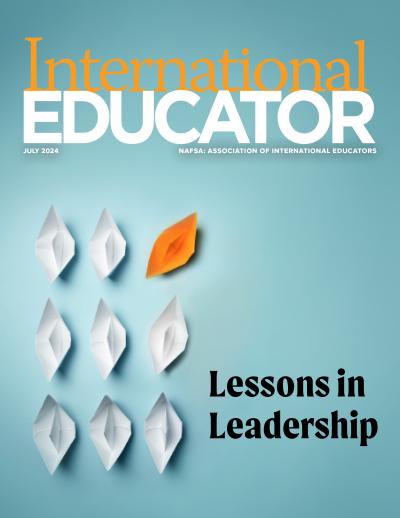Voices from the Field: Duty of Care During a Time of Uncertainty

In a period of uncertainty for many on college campuses, students, faculty, and staff are all bracing for the effects of funding freezes, budget cuts, and the current political climate. We asked several international education professionals to share their perspectives on navigating duty of care for their students in today’s environment, as well as any signs of encouragement they see.
Their responses reveal both the challenges and opportunities in ensuring students’ well-being while fostering meaningful international education experiences.
How are you navigating your duty of care to students in the current environment?
“With a great deal of empathy and kindness. I try to remember that our students are processing and reacting in different ways. Some want to talk about it, some do not, some want distractions, and most just want to feel supported. I am taking my cues from the students I’m interacting with.” —Patricia B. Goldman, Assistant Director of International Student Engagement, Lehigh University
“Given the current uncertainty in higher education, I think that our presence and support for students are more critical than ever. Even if we don’t have all the answers, it’s important to continue listening actively to the communities we serve, keeping those communication channels wide open, and showing members of those communities that we truly understand their concerns and fears.” —Laure Bordas-Isner, International Student and Scholar Adviser, University of Michigan
“Being a small office, we constantly feel like we are not doing enough to prepare students before they go abroad, or to support them while they are abroad, or to help them make sense of their experiences after they return. The current environment has heightened these concerns, and the more we see in the news, the more we are aware of what we could do better and the less it feels like we have the ability to adequately address topics (like culture and identity, for example) that need to be addressed in order to fill the gaps in our duty of care.
We have been lucky in many ways because we have flown under the radar so far. While other offices—like our Multicultural Center, our Women and Gender Resource Center, and our Pride Center—have had their websites removed, we have not yet been asked to change our programming or website content. We have no plans to change any of our content until we are officially asked to do so, but we have made plans for this seemingly inevitable occurrence. One plan is to change our language surrounding diversity and identity. Instead of using words that are easily flagged as being related to [diversity, equity, and inclusion], we plan to use the phrase “being you abroad.” This phrase captures our commitment to each individual student’s unique needs, incorporates intersectionality, and, most importantly, helps us have discussions about the joys and challenges of exploring identity abroad.
Another change that has been successful for us is giving students an optional space to disclose information related to their health, identity, and background. Our predeparture advising form asks students about their physical and mental health, current medications and treatments, disability accommodations, citizenship, sex, gender, sexual orientation, race, ethnicity, and more. The form is available after students have been accepted to their program and is used for advising purposes only. We initially received pushback from our university’s legal counsel, so we made most of the questions optional as a compromise. However, all study abroad students are required to sign their name, indicating that they have reviewed the information in the form. Even with the optional questions, many students do choose to disclose important information in the form, and this gives us an opportunity to further assist those students and connect them with resources. Even if students choose not to disclose information on the form, we hope that seeing the topics will spark some thoughts and motivate them to do their own research.” —Courtney Lucas, Director of Education Abroad, East Tennessee State University
“With temperance, consideration, and advocacy. Listening to students, acknowledging their fears, helping to filter the rhetoric to address facts, and admitting that ambiguity is hard. I’m meeting with many small groups on campus to have more candid conversations. Advocating up to leadership about what we are seeing in the field, thanks to NAFSA and the many attorneys who are filtering through the muck.” —Mary Nellis, Director of International Services for Students and Scholars, Rensselaer Polytechnic Institute
“My work as an education abroad adviser has always been rooted in health, safety, and well-being. When you view this work holistically, you see that all of it, from getting academic credits transferred to supporting students navigating a different country’s health-care system, is about [students’] well-being. While policies are shifting, this root has not changed.
With this in mind, I navigate my duty of care to students by being adaptable and collaborating with colleagues through the changes. I have to give a shout-out to Kory Saunders, who has helped me frame it in this way!” —Angela Luedke, Education Abroad Adviser, University of North Carolina-Wilmington
“At this time, the best we can do is be aware of the changes in the current environment and keep students informed, but be careful not to incite fear. It’s difficult not to overreact in one way or another, and I believe it’s important to maintain a level head for our students. I try to be optimistic and identify creative approaches in the face of the political and bureaucratic barriers that abound today.” —Kate Learch, Director of Study Abroad, University of North Florida Coggin College of Business
What is something that has encouraged you lately?
“With a great deal of empathy and kindness. I try to remember that our students are processing and reacting in different ways. Some want to talk about it, some do not, some want distractions, and most just want to feel supported. I am taking my cues from the students I’m interacting with.
I work with our international orientation leaders. This year, they have doubled down on their efforts to make sure our new students feel welcome when they arrive on campus in August. It’s inspiring to see how dedicated and excited they are to support their peers.” —Patricia B. Goldman, Assistant Director of International Student Engagement, Lehigh University
“I attended NAFSA’s Advocacy Day 2025, which was a fantastic reminder of why I love working in international education, despite the current challenges. The passion, the way everyone supports each other, and the overall sense of hope among international education professionals are amazing. It’s inspiring to see how much people who work in our field genuinely care about their students and each other.” —Laure Bordas-Isner, International Student and Scholar Adviser, University of Michigan
“Something that always encourages me is working with our Study Abroad Ambassadors. We created our ambassador program in fall 2023 with the goals of encouraging students from all backgrounds and majors to study abroad and [increasing] support for students exploring and preparing for programs abroad. We hoped the ambassadors would inspire other students, but what I did not expect was that they would inspire me, too. I am confident in saying that our ambassadors are some of the most hardworking, talented, intelligent, kind, and thoughtful students in the world. Each time I have the privilege of talking or interacting with them, I am hopeful for the future that they are helping to shape. I know we are in good hands with students like them in the world.
Another thing that has encouraged me is meeting with my NAFSA Academy cohort. I completed the NAFSA Academy in 2024, and I truly became friends with the members of my cohort. We decided to continue meeting regularly just to check in with each other and offer support and encouragement. Talking with them reminds me that we are all struggling, but we are all succeeding, too. Most importantly, we know we can rely on each other for help when we need it, and this is so important, especially now.” —Courtney Lucas, Director of Education Abroad, East Tennessee State University
“Spring is here; it is the most optimistic of seasons. Days are longer. Green is popping up everywhere. We are getting ready to celebrate graduates and spend time surrounded by the collective pride that we all have in our students!” —Mary Nellis, Director of International Services for Students and Scholars, Rensselaer Polytechnic Institute
“It is inspiring to see community continue to come together. The North Carolina Association of International Educators (NCAIE) hosted a virtual meetup titled “Navigating Shifting Guidance and Policies Under the New Administration and What It Means for International Education,” which created a brave space to ask questions and work together. I am a panelist with three incredible colleagues on a JEDI Lab session for COMPEAR’s Global Respectful Disruption Summit titled “Our Liberation Is Interconnected: Leveraging Whiteness as an Invitation for Reflection and Disruption.” This work continues to encourage me daily.” —Angela Luedke, Education Abroad Adviser, University of North Carolina-Wilmington
“I attended our university’s admitted students’ day a couple of weeks ago, and a student and parent from out of state told me they had come to UNF specifically for our international dual bachelor’s degree and study abroad programs. We don’t have a huge marketing budget, so it’s exciting—and validating—when a student from several states away comes across our programs and it resonates. It’s like kismet!” —Kate Learch, Director of Study Abroad, University of North Florida Coggin College of Business. •
About International Educator
International Educator is NAFSA’s flagship publication and has been published continually since 1990. As a record of the association and the field of international education, IE includes articles on a variety of topics, trends, and issues facing NAFSA members and their work.
From in-depth features to interviews with thought leaders and columns tailored to NAFSA’s knowledge communities, IE provides must-read context and analysis to those working around the globe to advance international education and exchange.
About NAFSA
NAFSA: Association of International Educators is the world's largest nonprofit association dedicated to international education and exchange. NAFSA serves the needs of more than 10,000 members and international educators worldwide at more than 3,500 institutions, in over 150 countries.
NAFSA membership provides you with unmatched access to best-in-class programs, critical updates, and resources to professionalize your practice. Members gain unrivaled opportunities to partner with experienced international education leaders.











